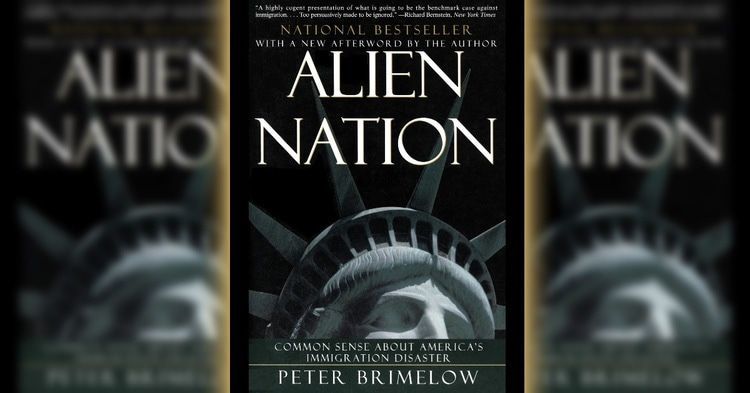


05/11/1995
By Peter Worthington
The Toronto Sun
May 11, 1995
[See also Author Challenges Immigration Myths, By Peter Worthington, April 27, 1995]
A couple of columns ago I wrote about a startling new book that’s rocking America — Alien Nation (Random House) — by Peter Brimelow which he, I and everyone who knew about it figured would cause a firestorm of backlash and controversy when it was published.
This is supposed to be a reaction many writers desire and, indeed, in cases can be profitable albeit unpleasant if the author in question has even the semblance of a thin skin. So far, the reaction to Alien Nation seems to exceed expectations (hopes? apprehensions?) and Brimmy, despite his intellectual courage and zest for debate, seems a trifle nonplussed by the venom directed at him for espousing what to him, and others, seems largely common sense.
Before getting into reaction, I've had phone calls from people who say they've been met by blank stares when they've asked about the book at stores. Apparently it isn’t available in Canada — yet. This oversight puzzles Brimelow and feeds the paranoia of those who wonder if its contents are too volatile for his Canadian publisher. Still, it’s irritating to have interest piqued by a book which isn’t available.
Brimelow’s thesis is that the U.S. Immigration Act of 1965 virtually opened the door to the Third World and closed it on Europe, and radically altered the racial and ethnic composition of America. Since so many immigrants are now unskilled, illiterate and illegal, a disproportionate number wind up on welfare, in prison or on the streets (in the old days failures went home), and the damage done to the country is incalculable.
Brimelow notes that Third World immigrants tend to concentrate on specific areas and are not evenly dispersed across the country. Six states get 75% of all legal immigrants — California, Texas, Illinois, Florida, New York and New Jersey — and they gravitate to six metropolitan areas — Los Angeles, Anaheim, Chicago, Miami, New York and Washington, where they aren’t easily absorbed and put intolerable strain on local budgets. (In Canada, Toronto, Vancouver, Hamilton and Windsor attract a disproportionate number of newcomers and distort the heritage and cultural composition of Canada as a whole — be it for better or worse).
BRANDED A RACIST
Brimelow’s book scolds that the immigration phenomenon has been imposed on citizens without their knowledge or consent. Criticizing immigration is taboo among polite circles, and any who question policies tend to be branded as racists (as the Sun papers know when they challenge lunatic policies or abuses here). Brimelow notes wryly that today’s definition of a racist is "anyone who is winning an argument with a liberal."
Jacob Weisberg, in New York magazine,is typical of the anti-Brimelow reaction when he suggests the book is "egregious bigotry" and akin to the type of pornography that once was sent by mail in plain envelopes or sold in dirty book stores. Weisberg predicts Alien Nation "will enrage sensible folk, convince no one, and earn a small fortune."
He calls Brimelow’s theme "in-your-face vileness," replete with "intellectual shoddiness," desperately trying to terrify the nation. He accuses Brimelow of trying to do to Hispanics what Charles Murray’s Bell Curve does to blacks. In fact, all Brimelow is doing is pointing out what he sees as reality, and says it straight, without euphemisms.
Weisberg is "amazed" that Random House would publish and endorse the book — which evolved out of a cover story Brimelow wrote for Bill Buckley’s National Review. Then, extraordinarily, Weisberg, apparent defender of unlimited, unskilled Third World immigration, shows his own prejudices by suggesting "an indefinite moratorium on right-wing Brits coming to tell us about threats to American values. As Archie Bunker might say, 'If you don’t like it here, go back where you came from.' "
BRITISH CONNECTION
One could argue that Brimelow wrote his book because he does like it here, and wants to keep it likable — as do immigrants and blacks who oppose excessive immigration. Brimelow, of course, is a British immigrant — as are National Review editor John O’sullivan (who, like Brimmy, once wrote columns for the Toronto Sun), and Harry Evans, publisher of Random House.
Even the Wall Street Journal, voice of intelligent conservatism, had a bitchy review of Alien Nation by a guy who'd written his own book on immigration and called Brimmy’s a "polemic" when, in fact, the review was a long polemic.
Anyway, Brimelow is a friend and his book is provocative, witty and unthreatening. Canadians reading it will have no difficulty relating it to our country, and those who should be most concerned with our present immigration policies are legal immigrants who've gambled their future by coming here and want to make it a worthwhile investment.